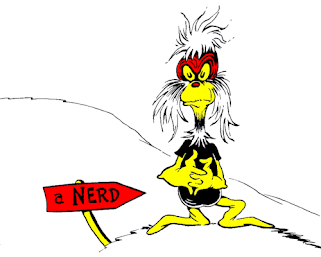Ever thought about where your favorite words came from? Spoiler alert: they were invented—yup, authors are the masterminds behind many words we use today! 🤓 Let’s take a look at how authors shaped the language with their creativity and made words we now use daily. 🚀
"Nerd" – Dr. Seuss’ Creative Brainchild 🤓💡
In 1950, Dr. Seuss made an epic contribution to the English language. He introduced the word "nerd" in If I Ran the Zoo. 🐯 The quirky, lovable term we all know today came from a Seuss book, and now it’s here to stay. 🎉 So next time you call someone a nerd, just remember Seuss was the pioneer of this fun word. 📚
Shakespeare: The King of Wordplay 🎭👑
Let’s talk about the OG author of word inventions: William Shakespeare. This guy didn’t just create words—he was a word wizard, blending and twisting existing words into brand-new ones. He gave us words like “bedroom,” “cold-blooded,” and “dwindle.” 🏰✨ He also turned nouns into verbs (hello, gossip and elbow), and sprinkled un- and -able all over the place. No wonder Shakespeare’s still considered the ultimate wordsmith! 🔥
"Freelancer" – Sir Walter Scott’s Legacy 💼💥
Ever wonder where the word "freelancer" came from? Thank Sir Walter Scott, the author of Ivanhoe. 💡 He coined this term for mercenaries (soldiers who work for whoever pays the most). Now we use "freelancer" to describe anyone doing gig work. Sounds cooler than “contractor,” right? But remember, it started with hired guns. 💥😅
"Twitter" – Geoffrey Chaucer’s Bird Inspiration 🐦💬
Did you know the word "twitter" (yes, the same one used for social media) was invented by Geoffrey Chaucer way back in the 14th century? 🕰️ It originally described the little tremulous sound birds make when they yearn for freedom. 🐦 Today, we’re all "tweeting" our thoughts, taking part in the same “twittering” but on a different kind of stage. 📱
"Robot" – A Sci-Fi Word That Took Over 🤖
The word "robot" came to life in 1920 through Karel Čapek's sci-fi play, where it described humanoid machines. 🤯 The term came from a Czech word meaning forced labor. Fast forward, and robots are now a part of our everyday lives, helping us around the house or even at work. 🛠️ We owe it all to Čapek! 👏
"Meme" – Richard Dawkins Gets Credit for Viral Content 🤳
Before memes were viral videos and pictures on the internet, Richard Dawkins invented the term "meme" in 1976. 🧠💬 He used it to explain how ideas spread, kind of like genes. It was all about passing along something that “survived” the test of time. Now, "meme" is used for everything from viral jokes to internet trends. Guess what? Meme is a meme itself! 😂
Some Words Stick, Others Don’t – And That’s The Fun Part! 🧠💥
Not every word gets to hang around forever. Why did "nerd" make it while words like “preep” or “nerkle” faded away? 🤔 It’s anyone’s guess, but maybe "nerd" just had a better sound to it. Regardless, we’re all part of deciding which words stick around, so keep an eye out—your next made-up word could be the next big thing! 🌟
The bottom line? Authors have been creating words for centuries, and we get to decide which ones live on. Whether it’s Shakespeare’s creativity or Seuss’ quirky genius, all words are invented by authors—and sometimes, we all get to help make them real! 🏆 So go ahead—create a word today! Who knows? It might just be the next big thing! 🚀

.png)
.png)



0 Comments